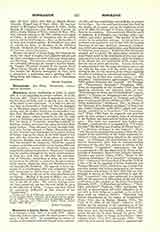

Honoratus, Saint, Archbishop of Arles; b. about 350; d. 6 (or, according to certain authors, 14 or 15) January, 429. There is some disagreement concerning his place of birth, and, as already seen, the date of his death is also contested. It is believed that he was born in the north of Gaul and that he belonged to an illustrious pagan family. Converted to Christianity with his brother Venantius, he embarked with him from Marseilles about 368, under the guidance of a holy person named Caprasius, to visit the holy places of Palestine and the laurae of Syria and Egypt. But the death of Venantius, occurring suddenly at Methone, Achaia, prevented the pious travellers from going farther. They returned to Gaul through Italy, and, after having stopped at Rome, Honoratus went on into Provence and, encouraged by Leontius, Bishop of Frejus, took up his abode in the wild island of Lerins with the intention of living there in solitude. Numerous disciples soon gathered around him and thus was founded the monastery, which has enjoyed so great a celebrity and which was during the fifth and sixth centuries a nursery for illustrious bishops and remarkable ecclesiastical writers. Honoratus’s reputation for sanctity throughout the southeastern portion of Gaul was such that in 426 after the assassination of Patroclus, Archbishop of Arles, he was summoned from his solitude to succeed to the government of the diocese, which the Arian and Manichaean heresies had greatly disturbed. He appears to have succeeded in reestablishing order and orthodoxy, while still continuing to direct from afar the monks of Lerins. However, the acts of his brief pontificate are not known. He died in the arms of Hilary, one of his disciples and probably a relative, who was to succeed him in the See of Arles. His various writings have not been preserved, nor has the rule which he gave to the solitaries of Lerins. Cassian, who had visited his monastery, dedicated to him several of his “Conferences”.
LEON CLUGNET

